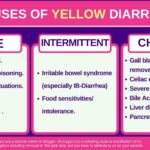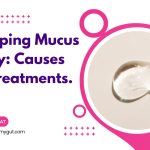How to Treat Yellow Stool: Gastroenterologist Explains.
Our content is not intended nor recommended as a substitute for medical advice by your doctor. Use for informational purposes only.
To treat yellow stool, you must first identify its cause and then treat it accordingly. Common causes of yellow stool to treat are IBS with diarrhea, fatty indigestion, gallbladder diseases, liver diseases, pancreatic diseases, medications, and bile acid diarrhea.
Step #1: Define the cause of yellow stool.
The first step to treating yellow stool is to define the cause of your condition. If you cannot detect a cause, consult your doctor to get a diagnosis. After establishing a diagnosis, treat accordingly.
Three factors can lead to the yellow stools:
- Diarrhea (speeding up of the stool inside your intestine):
The stool needs time to acquire its normal brown color inside the colon. Diarrhea (regardless of its cause) can lead to yellow stool. This is because stool has not had enough time to become brownish. - Presence of more fat inside your stool:
Fat is yellow. The condition that leads to increased fat in stool can lead to yellow stool.
Examples of conditions that lead to increased fat in stool: Indigestion of a large fatty meal, pancreatic diseases, gallbladder disease, liver diseases, and bile acid diarrhea. - Staining of your stool with yellow pigment: common causes are yellow foods such as:
* Carrots.
* Sweet potatoes.
* Tumeric.
* Any yellow Pigment containing food.
* Bilirubin is a yellow pigment that causes yellow stool for years in Gilbert’s syndrome.
Common causes of Yellow stools:
1- Irritable bowel syndrome with predominant diarrhea.
2- indigestion of a large fatty meal.
3- Acute infectious diarrhea, Giardiasis, and food poisoning.
4- Food intolerance.
5- Gallbladder diseases.
6- Pancreatic diseases.
7- Liver diseases.
8- Celiac diseases
9- Medications causing diarrhea or yellow stool.
10- Bile acid Diarrhea.
Below, we will provide you with a brief explanation of each condition and the best treatment.
To learn more about the causes of yellow stool in detail, Try to read these:
- Yellow diarrhea: Causes simplified.
- Yellow stool and abdominal pain are the cause.
- IBS Yellow stool: Is it a normal or a bad sign?
- Bright Yellow watery Diarrhea.
Step #2: Decide whether you need to see a doctor.
See a doctor to diagnose and treat your yellow stool if you have:
- Unexplained diarrhea.
- Fever.
- Vomiting.
- Severe abdominal pain.
- Jaundice (unexplained).
- Weight loss with attacks of yellow stools or diarrhea.
- Medical conditions include celiac, liver, pancreatic, and gallbladder disease.
- Take medications that can cause yellow stool (don’t stop prescribed medications yourself).
On the other hand, some simple conditions that may NOT require a doctor visit include:
- Eating more fat (indigestion of a large fatty meal).
- Having conditions that cause yellow stools, such as IBS with diarrhea or Gilbert’s syndrome.
- Eating yellow foods.
- Mild attacks of gastroenteritis that cause acute diarrhea and yellow stool (usually self-limiting).
Step #3: Treat according to the cause of the yellow stool.
1- IBS yellow stools.
A common condition where your bowel movement is frequent, associated with abdominal pain and change in stool consistency. Yellow stool is due to the speeding up of gastric contents (diarrhea).
Learn more about HOW IBS is diagnosed.
Learn more about IBS yellow stool.
Tips for treating IBS yellow stool:
- Eliminate FODMAP foods containing short-chain sugars that can trigger your IBS diarrhea and yellow stool. FODMAPs refer to Fermentable Oligo-, Di-, Monosaccharides, And Polyols. Learn more about the types of food you should avoid.
- Try a soluble fiber supplement such as Psyllium (Metamucil).
- Avoid a high-fat diet.
- Try to avoid Gluten (a protein present in wheat and rye).
- Try a Probiotic.
- Ask your doctor about anti-diarrhea medications for IBS, such as loperamide (Imodium A-D).
- Ask your doctor about Tricyclic antidepressants (TCAs) or Selective Serotonin Reuptake Inhibitors (SSRIs) for your IBS-D.
- If your diarrhea is resistant, Ask your doctor about other IBS-D-specific medications such as Alosetron (Lotronex), Elucadoline (Viberzi), Rifaximin (Xifaxan), Linaclotide (Linzess).
Learn more about IBS treatments:
2- Indigestion of a large fatty meal.
Eating large amounts of fat is common misbehavior by many. That is why we put it second in the order of the causes of yellow stool. Fat causes diarrhea, and also it is yellow, and this is why it causes yellow stool.
No specific treatment is recommended. Once you stop the bad habit of eating high-fat foods, the yellow stool will go away.
Eating healthy fat in moderation is not supposed to cause yellow stool or diarrhea.
If you experience diarrhea and yellow stool with normal amounts of fat, this may indicate “fat intolerance” or a condition called (bile acid diarrhea).
Discuss the issue with your doctor to determine the cause and the best solutions.
3- Acute infectious diarrhea.
Acute infectious diarrhea is a very common cause of yellow stools. It is a very common condition worldwide, both in children and adults. About 3-5 billion cases of acute gastroenteritis occur worldwide each year (ref).
Common causes of acute infectious diarrhea:
- Acute viral gastroenteritis (stomach flu) due to norovirus, rotavirus, or astrovirus.
- Food-borne illnesses (food poisoning) such as salmonella.
- Protozoal infections such as Giardiasis (a common cause of yellow stool).
Tips for treating yellow stool due to acute infectious diarrhea:
- Good hydration with water and bland fluids is critical.
- Eating BRAT diet: Bananas, Rice, Apple sauce, and Toast.
- Rest.
- Stop eating solid foods for a few hours if the condition is severe.
- Avoid caffeine, fatty foods, alcohol, and nicotine.
- Usually, medications are unnecessary unless the condition is severe, with fever or vomiting.
4- Food intolerance.
Common types of food tolerances that cause diarrhea and yellow stool include:
1- Lactose sugar in dairy products such as milk, yogurt, and cheese.
2- Gluten in wheat and barley.
3- Caffeine in coffee and other caffeinated drinks.
4- FODMAPs in people with IBS.
5- Salicylates: natural products in various foods (fruits, vegetables, teas, coffee, spices).
6- Fructose intolerance (fructose is a FODMAP) is most commonly found in ripe fruits and honey.
7- Fat intolerance.
Learn more about food intolerance and diarrhea.
Treatment of yellow stool due to food intolerance simply identifies and eliminates the offending foods.
If you suspect yellow diarrhea due to food intolerance, keeping a food diary and consulting your doctor or dietitian is better.
5- Gall bladder disease.
Any condition affecting the normal flow of bile from the gall bladder to the intestine can lead to changes in stool color (yellow stool).
Common causes of yellow stool due to gallbladder conditions include:
- Gallbladder removal (cholecystectomy).
- Gallbladder inflammation (cholecystitis).
- Gallbladder Obstruction by a stone or tumor.
Yellow stool, together with jaundice, is a sign of liver or gallbladder disease. Treating yellow stool is directed toward treating the primary condition affecting the gallbladder.
Diarrhea after gallbladder removal is common. It is a common cause of yellow stool.
Restricting fat in food is critical in treating yellow stools due to gallbladder disease.
Eating smaller meals with less fat content, treating the underlying cause, such as removal of obstructing stones, and treating gallbladder inflammation, will improve yellow stool.
Acute jaundice and pale yellow (clay) stool may be signs of biliary obstruction, requiring urgent medical intervention by inserting a stent into the bile ducts to restore bile flow.
6- Liver diseases.
Conditions affecting the liver (the bile factory) can lead to abnormal yellow stool.
Common causes of yellow stool due to the liver:
- Acute Hepatitis (especially due to hepatitis A virus).
- Chronic hepatitis (due to viral infections, Non-alcoholic steatohepatitis, alcoholic hepatitis, or autoimmune hepatitis).
- Liver cell failure (liver cirrhosis).
- Liver cancers (primary liver cancer or metastasis tumors).
Tips for treating yellow stools due to liver diseases:
- Close medical follow-up with your doctor because of the serious nature of liver diseases.
- Limit the high-protein and high-fat in the diet.
- Eat small, more frequent meals.
- Be compliant with the treatments prescribed by your doctor according to your specific liver condition.
Sometimes, you may continue to experience yellow stool with your liver condition (especially with Gilbert’s syndrome). Usually, this is not a cause for concern, and you can live with it.
7- Pancreatic diseases.
Acute and chronic pancreatitis leads to the destruction of the pancreatic tissue. Alcoholism, pancreatic duct obstruction, and high blood lipid are common causes of pancreatitis.
Damage to the pancreas decreases the digestive enzymes inside your digestive tract, leading to malabsorption syndrome (which will cause diarrhea and yellow stool).
Chronic yellow diarrhea and malabsorption are characteristic of Exocrine Pancreatic Insufficiency (EPI). EPI is a sequela of chronic pancreatitis.
Tips for treating yellow stool due to pancreatic conditions:
- Avoid alcohol completely.
- Limit fat in your diet.
- Take a pancreatic enzyme supplement.
- Avoid large meals; eat smaller, more frequent meals.
Work with your doctor to determine the best specific treatment for your condition (which may include surgical treatments). Learn more.
8- Celiac disease.
Celiac disease is a chronic medical condition due to sensitivity to a protein called “gluten.”
Gluten is present in wheat, rye, and barley-containing foods. Celiac disease causes severe diarrhea, anemia, and yellow stool.
Although there are no specific medications to treat celiac disease, eliminating the offending foods will dramatically improve diarrhea, yellow stool, and all other symptoms.
9- Medications.
Some medications can lead to yellow stool. Usually, the yellow stool due to medication is caused by drug-induced diarrhea.
Common medications that cause diarrhea and yellow stool:
- Laxative overdose.
- Some antibiotics.
- Some diabetes medications include Metformin (Commonly prescribed for people with type 2 DM).
- GERD and Gastritis Medications such as Proton pump inhibitors (omeprazole, esomeprazole, dexlansoprazole), H2 blockers (such as famotidine)
- Chemotherapy medications.
- Immunosuppressive medications are used in immune-mediated diseases.
CAUTION: don’t stop medications prescribed for your health conditions to avoid yellow stool or diarrhea. This may cause serious consequences.
Yellow diarrhea is usually not a serious health issue. Stopping the above medications without medical permission can lead to flare-ups or complications in the original disease.
Antibiotic-associated diarrhea and yellow stool can be treated with probiotics and changing or stopping the antibiotic (by your doctor).
10- Bile acid diarrhea.
Bile acid diarrhea is an underdiagnosed condition. It is caused by the failure of your digestive system to handle and re-absorb bile acids.
BAD is characterized by diarrhea, severe urgency, and yellow stool. Fatty meals usually trigger it.
Surprisingly, some studies suggest that bile acid diarrhea is misdiagnosed as an IBS-diarrhea. Some reports suggest that up to 40% of patients with IBS-D suffer from bile acid diarrhea. Learn more.
Treatment of yellow stool due to BAD:
- Sticking to a low-fat diet.
- Avoid butter, margarine, mayonnaise, fried foods, breaded foods, baked goods, full-fat dairy products, and high-fat foods.
- Shift to healthier fats (in moderate amounts) such as fish, avocados, nuts, and olive oil.
- Cholestyramine (Questran) is a very effective treatment, but you have to be diagnosed first by your doctor. Learn more.
MORE: Cholestyramine & Weight Loss: 5 Facts You Should Know.
- Evidence-based
- Written by a Doctor







